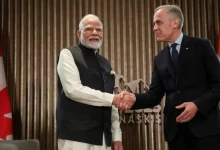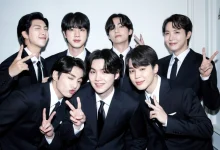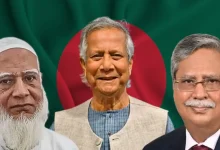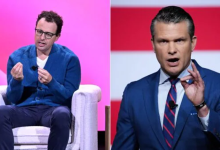Trump’s Gulf Gamble: AI, Oil, Missiles, and a New Regional Order
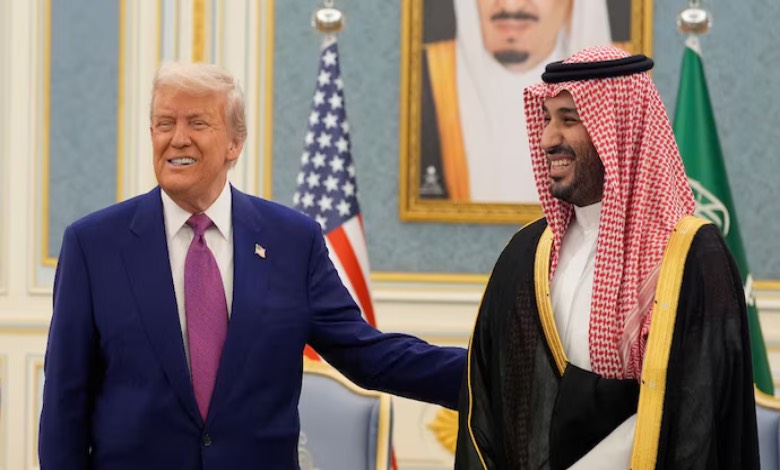
Donald Trump has returned to West Asia, but this time the geopolitical stakes are significantly higher. On his first major international tour since reclaiming the U.S. presidency, Trump’s agenda focuses sharply on artificial intelligence, energy markets, missile defense systems, and a potential civilian nuclear deal—a strategic blend reflecting his transactional style of diplomacy.
Trump is touring Saudi Arabia, the UAE, and Qatar—key Gulf allies of Washington. Notably absent from his itinerary, however, is Israel. There will be no stop in Jerusalem and no public meetings with Israeli Prime Minister Benjamin Netanyahu. Trump’s diplomatic focus is instead aimed squarely at powerful Gulf monarchies skilled at leveraging deals into strategic advantages.
Renewed Gulf Alliances, Elevated Ambitions
Trump’s Gulf relationships are longstanding and deeply intertwined with his own family’s business ventures. His family previously secured real estate deals in Saudi Arabia and the UAE, while Gulf state investment funds have poured billions into enterprises associated with Trump’s circle. This backdrop shapes his current diplomatic outreach, where Gulf states reciprocate with sizable investments, lavish summits, and high-profile diplomatic optics. In exchange, Gulf leaders expect advanced weapons, AI partnerships, and clarity on U.S. regional strategy—exactly what Trump seems ready to deliver.
Saudi Arabia’s Nuclear Ambitions and Oil Economics
Saudi Crown Prince Mohammed bin Salman (MbS), a key regional ally for Trump, is at the heart of two ambitious Saudi objectives: securing a formal U.S.-Saudi defense treaty and approval for a civilian nuclear energy program. Previous attempts at a trilateral agreement—where nuclear cooperation was contingent on Saudi recognition of Israel—are reportedly no longer being pursued, according to Reuters. This marks a significant policy shift, signaling Trump’s focus on direct bilateral engagement rather than broader regional normalization efforts.
In return, Saudi Arabia plans to invest up to $600 billion into the American economy, alongside negotiating a $3.5 billion arms agreement. A fundamental disagreement persists, however: Trump favors lower oil prices to strengthen the U.S. economy, while Saudi Arabia seeks higher revenues essential for financing its Vision 2030 diversification plan, creating subtle but critical tensions behind closed doors.
UAE’s Digital and AI Push
The UAE is pivoting decisively toward technology. Abu Dhabi recently announced a $1.4 trillion investment strategy focused heavily on artificial intelligence, semiconductors, and sustainable energy technologies. Previously hindered by Biden-era restrictions limiting access to advanced U.S. semiconductor technology—despite efforts by its AI powerhouse, G42, to distance itself from Chinese entities and align with Microsoft—the UAE is now benefiting from Trump’s reversal of the so-called “AI diffusion rule.” Trump’s administration claims this policy shift will facilitate American technological growth, allowing companies such as Alphabet, Qualcomm, and IBM to intensify their presence in the UAE as it seeks a dominant global position in AI.
Qatar’s Diplomatic Leverage
Qatar occupies a unique position in Trump’s Gulf strategy, notably hosting the largest U.S. military base in the region at Al Udeid. Qatar’s diplomatic credentials, highlighted through mediation roles with the Taliban and in Gaza ceasefires, position Doha as a critical intermediary in the region.
Doha is currently advocating for the easing of the U.S. Caesar Act sanctions on Syria, especially given recent Gulf engagement with President Ahmed al-Sharaa, who succeeded Bashar al-Assad. Yet Qatar remains cautious, awaiting explicit American backing before financially committing to Syrian reconstruction efforts.
Israel on the Sidelines
Trump’s exclusion of Israel from this pivotal Gulf tour is generating significant regional attention. With conflict continuing in Gaza, Trump’s provocative suggestion of potential U.S. administration of the territory sparked controversy across the Arab world.
Israeli sources indicate they perceive Trump’s Gulf visit as a timeline for finalizing a Gaza ceasefire. However, Trump’s refusal to publicly pressure Netanyahu, coupled with his preference for dialogue with Gulf leaders, sends a clear signal to regional actors that U.S. priorities may be shifting away from traditional Israeli alliances toward a more Gulf-centric strategic approach.
The Quiet Diplomacy of Iran
Despite Trump’s historical “maximum pressure” policy on Iran, discreet channels are reportedly active regarding Iran’s nuclear program. Both Saudi Arabia and the UAE appear cautiously open to discussions with Tehran, provided they bolster their strategic positions.
Additional diplomatic considerations include potential changes to Syria sanctions, proposals to rename the Persian Gulf as the “Arabian Gulf,” and expanded regional security frameworks. The Gulf states see an opportunity to influence U.S.-Iran engagement terms—and Trump seems receptive.
Economic and Strategic Power Summit
On May 13, a high-profile Saudi-U.S. investment forum in Riyadh will showcase global financial leaders and influential tech figures such as BlackRock CEO Larry Fink, Palantir CEO Alex Karp, and executives from Alphabet, Qualcomm, IBM, and Citigroup.
The attendance of key U.S. figures, like Trump advisor David Sacks on AI and cryptocurrency, highlights an ongoing shift of America’s economic and strategic focus towards the Gulf. This dynamic is no longer one-sided—American businesses actively seek deeper integration into Gulf markets, redefining the region’s economic landscape.
Trump’s West Asian Strategic Reset
Trump’s renewed Gulf engagement transcends symbolic diplomacy, representing a substantial recalibration of regional relations. His policy approach integrates conventional arms deals, advanced technologies, pragmatic politics, and economic partnerships, positioning Gulf states at the forefront of his strategic objectives.
With significant regional issues from Gaza to nuclear proliferation on the table, Trump’s gamble is clear: He’s betting heavily on the Gulf, rather than Europe or Asia, to deliver landmark diplomatic successes that could define his second presidential tenure.

